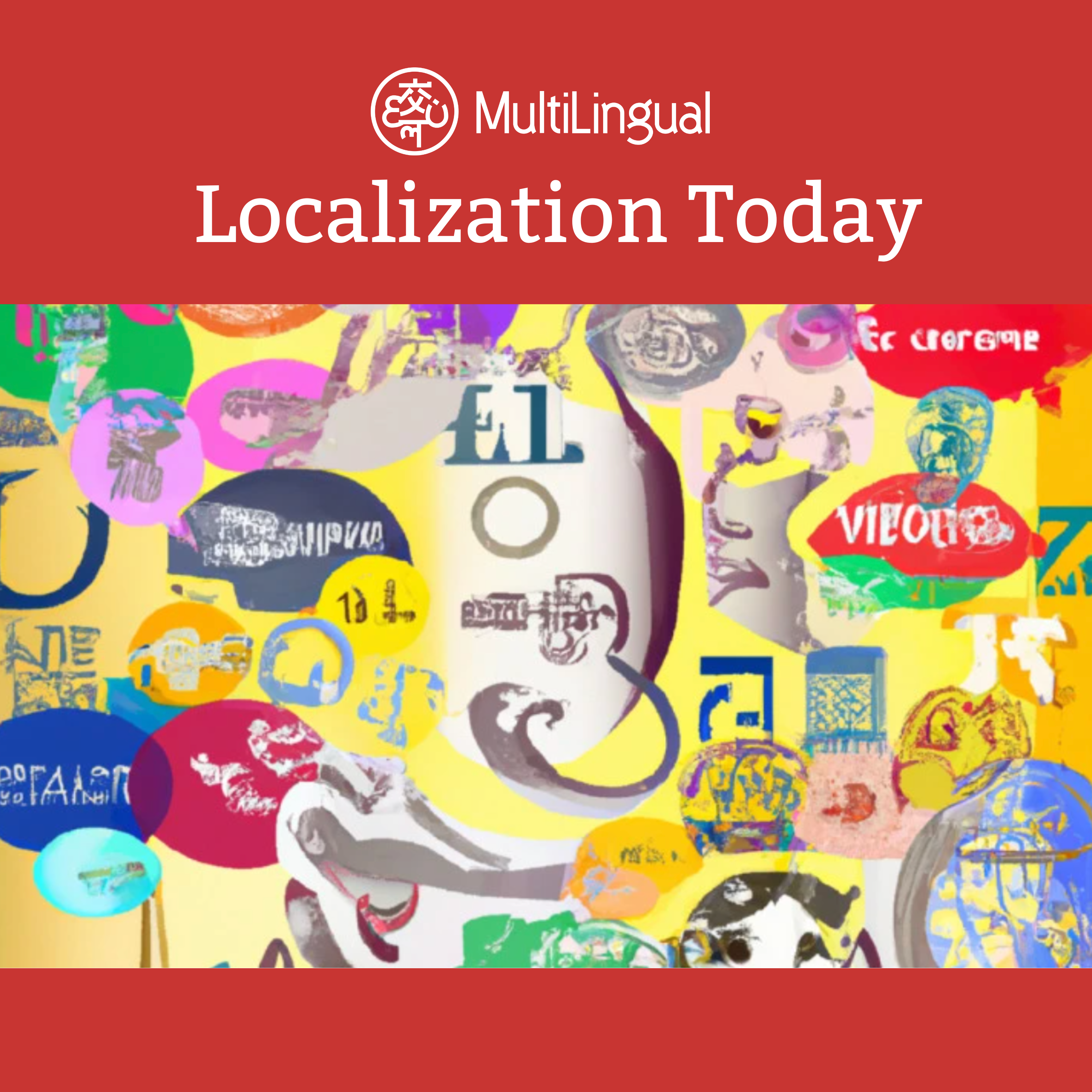Episode Transcript
[00:00:00] Canada the El Dorado of Professional Translation by Dominique Boba As a country with a long history of bilingualism as well as diverse indigenous and immigrant populations, languages are in Canada's DNA professional. High quality language services are not only required by law in many areas such as government, communications and regulated sectors, but also in demand by most businesses and organizations.
[00:00:30] Canada's language industry has a unique structure and is arguably rooted in the finest tradition of quality in the world.
[00:00:38] It's worth keeping an eye on its evolution and business model shifts in response to new technological and economic contexts.
[00:00:46] Industry players and Offerings In Canada, translation comprises two segments, translation for the public sector, which includes the translation Bureau and federal government agencies on the one hand, and translation for the private sector on the other. The Canadian market is notoriously segmented with numerous small entities and thousands of self employed language professionals, many of whom specialize in niche areas.
[00:01:14] In house Corporate language departments, many of which have set up their own language teams, are making a comeback following a shift toward outsourcing in recent years.
[00:01:24] These in house departments enjoy the benefit of in depth product knowledge and are extremely helpful subject matter experts for language service providers LSPs who view them as specialized peers.
[00:01:36] Canada is ahead of the game here, as many LSPs cooperate with in house language departments, the former offering volume capacity, the latter a watchful eye and a privileged partner for terminology and sector specific knowledge.
[00:01:50] Long focus on the country's official languages English and French Canadian LSPs have recently rolled out multilingual packages and services in native languages, undertaking a meticulous recruitment and training of a qualified multilingual pool.
[00:02:06] Additionally, some industries have opened their doors to translating certain important documents, for example mortgage contracts into migratory languages for newcomers to Canada who are not fluent in the official languages.
[00:02:20] Indeed, Canada boasts a strong history of welcoming immigrants for their contributions to economic growth, including people in vulnerable situations, foreign students, and temporary workers.
[00:02:32] Canada's immigration policy has created a need for interpreters, particularly community interpreters, in hundreds of languages, positions that are sometimes difficult to fill with qualified individuals.
[00:02:45] Education and Recruitment Recruitment for language industry roles is highly dependent on the availability of new graduates from Canadian translation programs, formal academic training, and certification from the Order des Traductors Terminalogues et Interprets Agrees du Quebec Audiac, Quebec's regulatory body for linguists are highly valued.
[00:03:09] As for graduate programs, they are primarily sought after by international students, showing the attractiveness of Canada and the quality of its education.
[00:03:19] According to Patrick Drouin, director of the Department of Linguistics and Translation at the Universite d Montreal, applications for language programs remain stable, although a slight decline was observed a few years ago. The placement rate is high, with demand for interns exceeding the number of students, he says.
[00:03:37] The revaluation of the role of language professionals would benefit from being better presented to future cohorts calling for more robust cooperation between the academic and professional worlds.
[00:03:49] One example is the Audiac mentoring program, which provides language pairing for cohorts aspiring to professional experience.
[00:03:57] Moreover, technical skills should be emphasized in translation programs. According to Zhuang, academic programs may be slow to change as compared to the unprecedented speed of technological progress.
[00:04:10] However, professors are able to make changes and modernize current curricula to better fit the profession's evolution and the market needs.
[00:04:19] Specialists have joined professors and are now contributing to reorganization and enrichment of program contents for a modernized adaptation Artificial intelligence AI technology appropriation of neural technology by translators, understanding of large language models, LLMs, and evaluation of their quality, query writing strategies quality accreditation and strict standards over the years, the high profile role of translation in Canada has led to corporate and institutional communications that are infused with quality and a clientele accustomed to precise, accurate and localized language.
[00:05:00] The Audiac regulates some 2,900 certified translators with a mission to promote high professional standards and protect the public against the risk of prejudice caused by an error or malpractice. Being a certified translator, interpreter, or terminologist means committing to a code of ethics and above all, accepting professional responsibility, says Betty Cohen, Audiac president.
[00:05:23] In the era of AI and automated translation, responsibility is key. Canadian LSPs adhere to the Canadian General Standards Board's Canadian Translation Standards, International Organization for Standardization standards, and other standards in response to the needs or pressures of customers demanding information technology, IT security, cybersecurity, and data hosting.
[00:05:48] These standards require LSPs to make significant investments, implement process changes, and undergo inspections.
[00:05:55] Compliance and self imposed strictness enable them to showcase these considerable efforts.
[00:06:02] Technology Adaptation the Canadian model, while being a stronghold of quality, has kept its momentum regardless of technological advances.
[00:06:12] Progress in machine translation, MT and AI well integrated into processes and widely marketed to customers, has in no way weakened demand.
[00:06:23] Rather, companies equipped with their own AI tools, having internalized the AI translation component, are after a few months reverting to LSPs who become language auditors and sell their own AI services in secure IT environments.
[00:06:39] Moreover, customers who once invested in their own language AI have been returning to LSPs. According to Joe Grimaldi, Chief Revenue Officer, CRO of Canadian LSPTRSP, easy translation is a mere dream. In the absence of development, training, and resources, a new clientele is born. They used to translate their own content without professional help or linguistic revision. But now they use AI and are concerned about this growing automation that seems out of control.
[00:07:10] Technology, which which has long aroused suspicion among language professionals, is now well anchored in processes and in people's minds. The lightning speed at which technology is evolving, however, is causing a mix of concern and excitement for Canadian LSPs.
[00:07:26] Francois Chartrand, President and chief executive officer, CEO of Versacom, Canada's largest lsp, says, we owe it to language professionals to support them in the face of technological changes. It's our duty. When we recall the pioneers of the Canadian market such as Benoit Leblanc of Versacom and Serge Bilir of trsb, who were instrumental in building the Canadian professional translation industry, its processes, its quality and its roots in the Canadian economy and society, he adds, our challenge today as LSPS is to position ourselves as suppliers of technology led solutions to clients who are now embracing AI, using it and turning the output over to LSPs for review, fully aware they lack professionals trained in AI control.
[00:08:14] This type of clientele may indirectly perceive LSPs as users, technology providers, trainers, quality control instruments, or even a recruitment agency that dispatches language professionals to compensate for the absence of on site language resources that their clientele may lack.
[00:08:32] The insourcing of AI tools would imply that customers entrust assignments to professionals, but if not, who holds the steering wheel and who is accountable for the ultimate seal of approval?
[00:08:44] Thus redefined in house, linguistic services could be reborn. Interestingly, technology companies with no language expertise are taking the lead from LSPs by offering content management systems, CMS style language management solutions that frame, frame language services and manage a pool of suppliers and their language assets.
[00:09:05] Canada's Place in the Global Market the extraordinary adaptability of Canadian LSPs helps to ensure a robust market and a certain immunity to foreign competition. The international public knows the worth of Canadian quality and cannot truly compete with it, says Grimaldi. Our clients are so integrated into our ecosystem that foreign firms would find it difficult to grasp. This cozy isolation needs to be tempered. Though LSPs recognize the need for growth, business expansion and even mergers and acquisitions, albeit at a modest pace.
[00:09:42] An ideal scenario would be marriages between Canadian owned companies to avoid clashes in professional culture.
[00:09:50] According to Chartrand, Canada has leadership capacity in the global translation market and an appetite for potential M and A. The uncertainty of the economic climate could result in a feeling of erosion, with the risk of investors taking over and perceiving more than Canadians do an untapped potential.
[00:10:09] The global market is tightening, but Canada is a most attractive El Dorado on an international scale, leading firms are well positioned as a gateway to language solutions, blending technology and professional services.
[00:10:24] Our teams must move to the next level of technological enhancement and steer our customers as an extension of their organizations, not an expensive extra but a necessary expansion of their operations.
[00:10:36] While redefinition is necessary both intrinsically by reassessing achievements and extrinsically by integrating new technologies and skills, growth remains the common denominator for Canada's upward trajectory, even if this requires an ongoing review of business models.
[00:10:53] Business Models for Growth One success story is Nations Translation Group, which represents the first nations community.
[00:11:02] It is the third largest Canadian LSP in terms of revenue and in house linguists and the second largest Canadian privately owned lsp.
[00:11:11] When Andre Polaguini took over leadership of the group as CEO, he strove to take the company further with a vision of implementing robotics tools and processes as a pillar for high productivity and efficiency.
[00:11:23] In addition, diversification strategies resulted in lowering the weight of government clientele to a more balanced level with the private sector as well as in reinforcing interpretation services in all their formats. Consecutive, simultaneous in person etc.
[00:11:40] Language services are the core services, but nations remodeled its structure to offer content strategy based language services and became well known in training AI engines including data curation and eventually synthetic data.
[00:11:55] Nations has an appetite for acquisitions and unsurprisingly envisions international growth.
[00:12:02] According to Palaguini, what is so special about the Canadian lsps is that they can offer more services and language intelligence that other LSPs cannot. For now, for example concierge level customer service with quick turnaround and access to human linguist expertise and feedback.
[00:12:21] Canadian LSPs are not in the market of low quality postediting.
[00:12:26] They use AI and tech tools with the highest standards of quality control processes in the world.
[00:12:32] Companies will be seeking high class LSPs. The Canadian market is distinctive in its possession of not only project managers but but also in house full time linguists as quality custodians of client knowledge.
[00:12:45] Ten years ago, amid the enthusiasm about automatic translation, it quickly realized that computer assisted translation, CAT and AI are tools to help professional translation become more efficient.
[00:12:58] According to Palaguini, many executives, though not all, have become aware that tools are not a mere license to sign on.
[00:13:06] They also realize that wording can indicate whether text is AI based only or whether there was human involvement.
[00:13:13] Machine text styles do not engage their target audiences. We all sound the same when we use AI only.
[00:13:19] Companies must now use smarter strategies to mitigate the risk of losing customer commitment through too common and overused wording training. AI is an extensive process that benefits from human interaction.
[00:13:33] Translators do not translate sentences.
[00:13:36] They help companies access markets by translating their content effectively. TRSB employs another successful business model. According to Grimaldi, TRSB founded its workforce strategy on language specialists with a broad understanding of different areas of expertise, which represents a solid advantage for customers.
[00:13:56] TRSB has also established an academy for new recruits and language professionals with wishing to move into a different field of specialization or to learn more about technology.
[00:14:07] This one stop shop business model can offer peace of mind for users in terms of security and ease.
[00:14:13] Future challenges and Outlook Pricing issues resulting from tight bottom lines, low cash flow, and other economic irritants may weaken translation companies, causing them to sell or merge.
[00:14:26] Top Canadian LSPs have a lot of room for MA and might be tempted to acquire midsize entities as their limited capacity may hinder scaling.
[00:14:36] Small companies may suffer or disappear due to a lack of funding or vision.
[00:14:42] Transactional and legal costs must be taken into account.
[00:14:45] The language industry must parallel the economic context. Historically, when companies possess enough liquidity, they can go through a crisis such as a pandemic with with a certain ease, whereas others struggle and cut, cut, cut. Volumes will continue to rise, ensuring steady incomes, but technology investment needs may soar. Despite these challenges, Canada is well positioned for growth in terms of skills and professional expertise in a legislative context that makes bilingualism a compulsory requirement. Translation and interpretation have earned enviable positions as valuable assets in many economic sectors and will likely continue to be in high demand even alongside technological advancements.
[00:15:31] This article was written by Dominique Bobot, a language consultant and translation strategist at Nimzy Insights, a market research and consulting company that specializes in language and localization.
[00:15:43] She is recognized for her expertise in the Canadian and Quebec markets.
[00:15:48] Originally published in Multilingual Magazine, Issue 241, 6-20-25.


